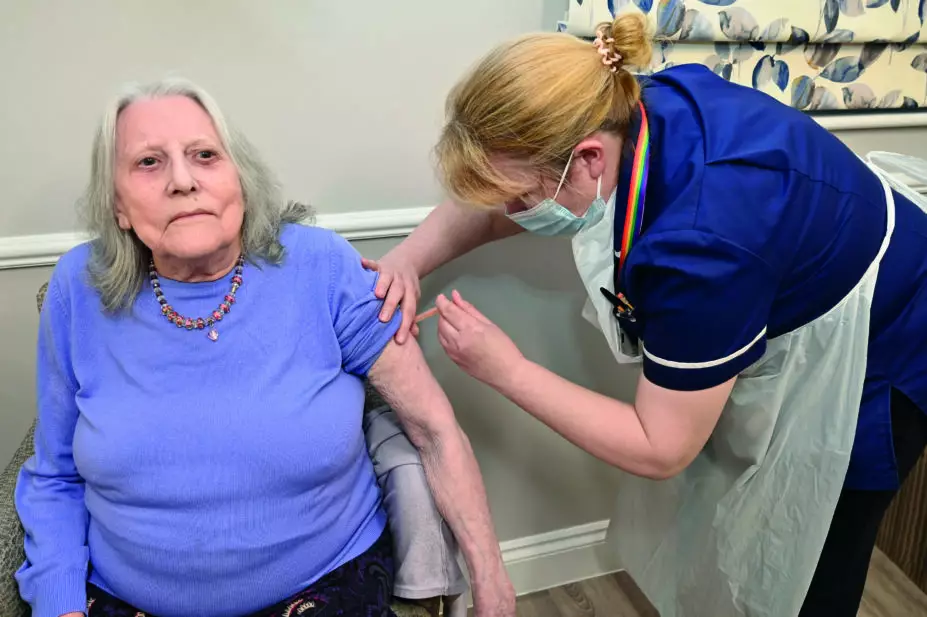
DR P. MARAZZI/SCIENCE PHOTO LIBRARY
Open access article
The Royal Pharmaceutical Society has made this article free to access in order to help healthcare professionals stay informed about an issue of national importance.
To learn more about coronavirus, please visit: https://www.rpharms.com/resources/pharmacy-guides/wuhan-novel-coronavirus
The COVID-19 vaccination programme has prevented 10,400 deaths among those aged over 60 years in England as of March 2021, Public Health England (PHE) has said.
In a statement published on 8 April 2021, PHE said that the figure was calculated by comparing the observed number of deaths between 8 December 2020 and the end of March 2021 with the number of deaths expected if there had been no vaccination programme.
It estimated that 9,100 deaths were prevented in people aged 80 years and over; 1,200 in those aged 70–79 years; and 100 in those aged 60–69 years.
PHE added that there was “increasing evidence that vaccines help to reduce transmission”, meaning that the true number of prevented deaths is likely to be higher.
In response to the figures, Matt Hancock, the health secretary, said that “the science is clear: vaccines save lives”.
“All three of our approved vaccines have been deemed safe and effective by our world-class independent medicines regulator,” he added.
“The new figures published today [8 April 2021] show why it’s so vital that people get their second dose too. When people get the call, they should get the jab.”
The announcement followed reports of “extremely rare” incidences of blood clots and low platelet counts in patients who had received their first dose of the Oxford/AstraZeneca vaccine.
In a report published on 7 April 2021, the Joint Committee on Vaccination and Immunisation concluded that “it is preferable for adults aged [under] 30 years without underlying health conditions that put them at higher risk of severe COVID-19 disease, to be offered an alternative COVID-19 vaccine, if available”.
As a result, in a letter published on 7 April 2021, NHS England advised pharmacy-led vaccination sites that first-dose Oxford/AstraZeneca vaccine appointments would be cancelled for those aged under 30 years with no underlying health conditions from 9 April 2021 onwards.
The letter says that, following the cancellation of appointments, those aged under 30 years will be asked to contact their GP team to discuss the benefit and risks to them of the Oxford/AstraZeneca, or another, vaccine.
The letter adds that all those who have already received the first dose of the Oxford/AstraZeneca vaccine should go on to be given the second dose.
Why are those aged under 30 years being offered an alternative to the Oxford/AstraZeneca vaccine?
Currently, people in the UK are being offered one of three COVID-19 vaccines: Pfizer/BioNTech, Oxford/AstraZeneca and Moderna.
As of 31 March 2021, 20.2 million doses of the Oxford/AstraZeneca vaccine had been given in the UK. This means that the overall risk of blood clots is approximately 4 in every 1 million people who receive the vaccine, the Medicines and Healthcare products Regulatory Agency (MHRA) said.
For both the Pfizer/BioNTech and Oxford/AstraZenceca vaccines, 3 to 6 Yellow Cards per 1,000 doses administered have been reported, with the “overwhelming majority” for reactions such as a sore arm, or for flu-like symptoms.
Speaking at a press conference on 7 April 2021, Jonathan Van-Tam, the deputy chief medical officer, said that the risks versus benefits of the Oxford/AstraZeneca vaccine are “finely balanced” in those aged 20–29 years, but in older age groups the risk/benefit ratio is “overwhelmingly in favour” of the vaccine.
The MHRA also said that the expected benefits of COVID-19 vaccines “far outweigh any currently known side effects”, and that “as with all vaccines and medicines, the safety of COVID-19 vaccines is continuously monitored and benefits and possible risks remain under review”.
READ MORE: Everything you need to know about COVID-19 vaccines


